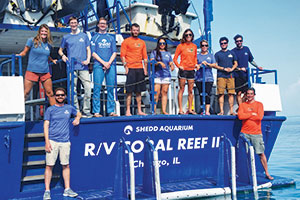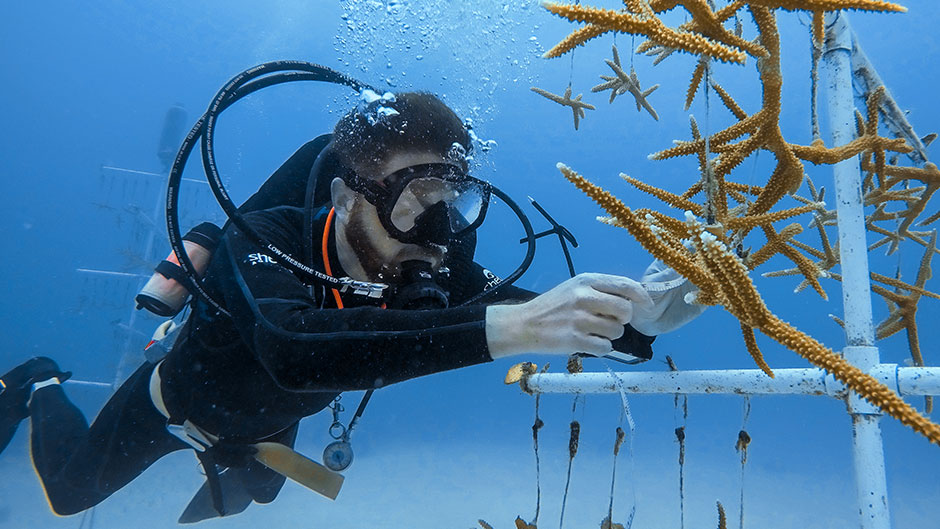It started, really, with an interest in figuring out how things work and a love for the outdoors. This led to pursuing a degree in biology, which led to a study abroad trip to Australia, and finally, the opportunity to snorkel and dive in the Great Barrier Reef.
That was the tipping point, the moment when, surrounded by the diversity of life, by the shapes and sizes and colors on coral reefs, Ross Cunning, the young boy from Indiana who had never been particularly interested in the ocean, became Ross Cunning, the marine scientist, the coral enthusiast, and soon-to-be coral expert.

"As a college student, I’m seeing these coral reef ecosystems that I had never seen or been exposed to before,” Cunning recalls. “And all of a sudden, there's this this whole fascinating new world before me, to study and to learn from.”
Since then, Cunning has devoted his career to studying corals and to finding ways to increase their chances of survival in the face of climate change.
As a graduate student at the Rosenstiel School of Marine and Atmospheric Science, he conducted cutting-edge research on how the algae that corals rely on for food and gives corals their color affect their responses to climate change. He developed a molecular genetic technique, still used at the school today, to measure the algae in a coral, which opened the door to asking and answering a number of important research questions.
He later developed theory and mathematical models of coral bleaching while a fellow at the Hawaii Institute of Marine Biology and worked on ways to make corals more tolerant to warmer ocean temperatures as a postdoctoral research scientist at the U.
Cunning is now a coral research biologist at Shedd Aquarium’s Daniel P. Haerther Center for Conservation and Research in Chicago, where he studies coral reefs in Florida and in the Bahamas to understand how to sustain reef ecosystems in the face of a changing climate. In the labs, he does genetic sequencing to identify the genetic and ecological factors that make certain corals more tolerant to increasing temperatures.
In the field, he looks for the corals that are best equipped to deal with warming waters in order to support coral restoration efforts (the practice of growing corals in nurseries and outplanting them to mitigate the decline of coral reefs).
On his most recent research expedition, he was at sea for over two weeks, diving with his team (which included University of Miami graduate students and collaborators) to collect staghorn corals from coral nurseries along the coast of Florida and testing their ability to withstand heat in small experimental tanks aboard the ship.
And when he’s not analyzing coral DNA or publishing his findings, Cunning is educating the public or, sometimes, cleaning the coral reef habitats at Shedd Aquarium. “It’s the best of both worlds,” he says. “I still do my research down in Florida and the Bahamas. But then the rest of the year, I'm here in Chicago, and I have the opportunity to communicate the work that we're doing to large public audiences that need to hear these messages.”
Cunning has remained connected to the University of Miami, leveraging his strong connections with the Rosenstiel School, and the fact that Shedd’s research vessel is based in Miami, to bring the institutions together to work collaboratively on a number of important research projects.
In June, graduate students from Dr. Andrew Baker’s lab, where Cunning himself was a student, will join him on another expedition to collect corals and test their heat tolerance, this time in nurseries in the Bahamas. “It’s a coming together of these two institutions in a very synergistic way to do some really exciting research,” Cunning says. “And it keeps me closely tied to Rosenstiel, which is fantastic.”
Ultimately, whether he’s at the U or at Shedd, on a research trip or communicating with students, donors, or the public at large, the goal remains the same – working to give corals the best possible chance of survival until the rest of the world can start to reverse the effects climate change. “Getting ocean warming under control is key to coral reef survival,” he says. “But until then, our focus is to help the corals become more resilient to get over the hump before things get better.”
His advice to students? “Be open minded about how you can contribute to making a difference for coral reefs. There are so many ways to get involved that aren't just doing research or doing some of the hard science. The more people with diverse skill sets, perspectives and backgrounds that can apply their talent, their passion, and their energy into solving a problem will make all the difference.”

